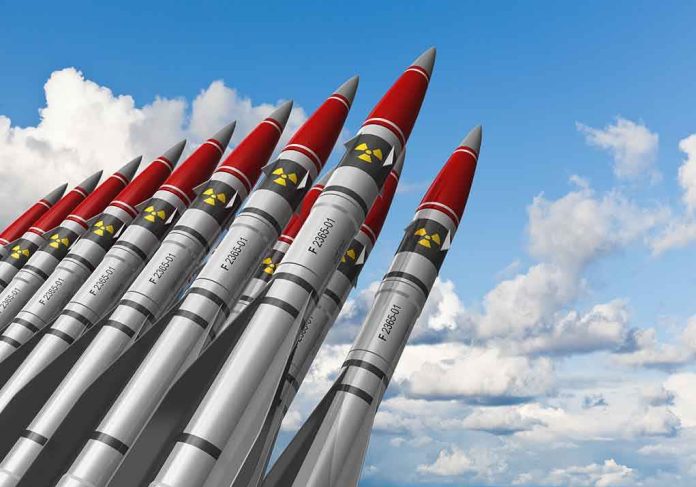
The world just watched as President Trump told Russia’s Medvedev to “watch his words” after a nuclear threat, then slapped India with a 25% tariff—leaving allies and adversaries scrambling, and Americans wondering how far these high-stakes games will go.
At a Glance
- Trump issued a blunt warning to Russia’s Medvedev after nuclear threats over Ukraine policy ramped up global tensions.
- The President enforced a 25% tariff on Indian imports, citing India’s trade barriers and ties with Russia.
- Medvedev invoked Russia’s “Dead Hand” nuclear system, escalating fears of Cold War-style brinkmanship.
- India’s continued purchase of Russian oil and military hardware triggered the White House response.
Trump Draws a Red Line on Russia—And India Pays the Price
President Trump’s ultimatum to Russia—agree to a Ukraine ceasefire within 10 days or face tariffs and sanctions—made headlines on July 29. By July 31, the President had doubled down, using Truth Social to warn former Russian President and current Security Council deputy chairman Dmitry Medvedev to “watch his words.” This came after Medvedev invoked the notorious “Dead Hand” nuclear system, a relic of Soviet-era doomsday planning designed to guarantee nuclear retaliation if Russia’s leadership was wiped out. Trump’s response was as direct as it gets: don’t test America’s resolve, and don’t mistake tough talk for weakness.
Trump brushes back Russia's Medvedev after 'war' warning: 'Watch his words' https://t.co/8qsajGm7GF
— Fox News (@FoxNews) July 31, 2025
But the fireworks didn’t end with Russia. Trump, never one to let a slight go unanswered, announced a sweeping 25% tariff on all Indian imports. The President called out India’s persistent trade barriers and its deepening economic partnership with Russia, especially its refusal to stop buying Russian oil and military equipment despite Western sanctions. The tariffs, effective August 1, are a shot across the bow not only for India but for any country that thinks it can play both sides while cashing in on American markets. For years, Americans watched as previous administrations tiptoed around India’s trade games, but those days are over. Trump’s tariffs are more than taxes—they’re a wake-up call to any nation betting against U.S. leverage.
Russian Nuclear Rhetoric Reaches a Fever Pitch
Medvedev’s invocation of the “Dead Hand” system is the kind of saber-rattling that makes ordinary Americans shake their heads in disbelief. Here’s a senior Russian official, just days after Trump’s ultimatum, openly referencing a Cold War doomsday device as if it were a bargaining chip. Medvedev’s message: cross Russia, and you risk nuclear annihilation. Analysts believe this is psychological warfare, an attempt to bluff and intimidate, but it’s reckless brinkmanship in a world already on edge. Trump’s choice to single out Medvedev, rather than Putin, is seen by diplomatic commentators as a calculated move—keeping lines open with Moscow’s ultimate decision-maker while putting hardliners on notice. Still, this kind of public nuclear signaling is exactly what makes the Ukraine conflict so dangerous for everyone, not just the politicians playing chess with other people’s lives.
Trump’s blunt response—“Tell Medvedev…to watch his words. He’s entering very dangerous territory.”—is a reminder that America won’t sit quietly while foreign strongmen threaten the world order. Conservative Americans have long demanded leadership that doesn’t cower before threats, and for better or worse, that’s what they’re getting. The only question is how far this war of words will go, and whether Russia’s threats are anything more than empty bluster. For now, the operational status of Russia’s “Dead Hand” remains unconfirmed, but its existence is acknowledged by experts and feared by strategists around the globe.
Trade Showdown with India: America First, No Apologies
The decision to slap India with a 25% tariff is about more than just dollars and cents. It’s about defending American jobs and sending a clear message: if you want access to the world’s largest market, you don’t get to bankroll our adversaries. India’s long history of trade protectionism, coupled with its unapologetic consumption of Russian oil, has finally caught up with it. Trump’s critics warn that tariffs could backfire, hurting U.S. businesses and consumers. But supporters argue that tough love is overdue—especially when American workers are already squeezed by inflation and global competition.
India’s government, led by Prime Minister Narendra Modi, now faces a dilemma: double down on its partnership with Russia, or risk losing a lucrative American market. So far, India hasn’t budged, but with tariffs in place and further penalties threatened, the stakes have never been higher. For decades, India has played both sides—partnering with the U.S. when convenient while keeping Moscow close for energy and defense. Trump’s move forces a reckoning, and it’s about time. Why should American taxpayers prop up a system that rewards our rivals while penalizing our own industries?
Global Fallout: Markets, Alliances, and the Fragility of Peace
The ripple effects of this week’s escalation are already being felt. U.S.-Russia relations, already at rock bottom, are now teetering on the edge of new and dangerous territory. Nuclear threats, even rhetorical ones, erode the stability that keeps accidental wars at bay. Meanwhile, the U.S.-India trade spat threatens to disrupt the flow of goods, drive up prices, and complicate an already fragile global economy. Energy markets are jittery, and American importers are bracing for impact as tariffs kick in.
But there’s a deeper lesson here—a reminder that America’s willingness to defend its interests is back, for real, and the days of apologizing for putting Americans first are over. Trump’s approach is a sharp break from the globalist consensus that prioritized international alliances over national priorities. Whether India and Russia like it or not, the new reality is a White House that won’t bow to pressure, won’t tolerate double-dealing, and isn’t afraid to use every tool—economic or otherwise—to defend conservative American values, jobs, and security.
Sources:
TIME: Trump-Medvedev nuclear war of words
The Independent: Trump, Putin, Medvedev, Russia trade





